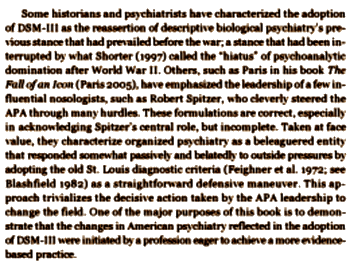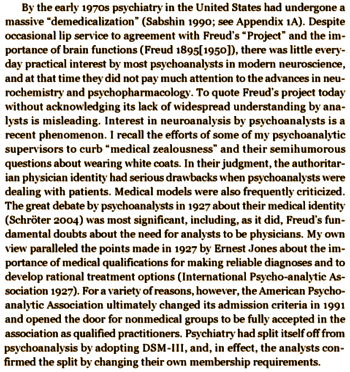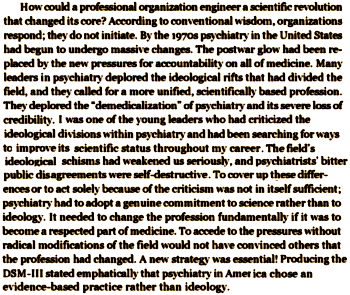

-
The Old Questions:
The Psychiatric Diseases were identified by Kraepelin a century ago and have remained essentially unchanged since that time, through many classifications [see a mere catalogue?…]. These Kraepelinian Illnesses were universally accepted as Diseases, probably biological in the minds of most. The borders with other people were distinct – both diagnostically and literally as most were in asylums back when, at least for some of the time. About that same time, Freud began to treat a different group of people who had symptoms and behaviors that he thought were generated by the mind and life. Over time, many other conditions were added to the mix by the psychologists, social workers, military psychiatrists, etc. This second group were generally thought to exist in people with an intact central nervous system. They were probably psychological and the borders with other [normal] people were indistinct. Except in crisis circumstances, they lived among us.Beside the questions of proof of treatment efficacy, the third party carriers were driven nuts by the indistinct borders of these latter conditions, and the psychoanalysts were of absolutely no help in defining these boundaries more crisply. So along came the DSM-III with its evidence-based medicine aiming to firm up the boundaries with its objective criteria. One Old Question was Why did they ablate the distinction between the Kraepelinian Psychiatric Diseases with definite borders and the second poorly delineated group? They all became just Disorders. And in one glaring instance, they destroyed that distinction within a major diagnostic entity – Major Depressive Disorder. Melancholia and Depressive Neurosis ran together, becoming a subtyping issue implying a groundless and unjustifiable continuity.
Another Old Question: While the DSM-III claimed to be non-etiologic, it was really something more than that – anti-psychologic is the only term I can think of. The Disorders known to be Brain Diseases are identified as such, but there was no place for psychological causation. So, why did all mental illness become not psychologic? Nobody thinks that all mental illness is non-psychological – not psychiatrists, psychologists, playwrights, social workers, neighbors, authors, psychoanalysts, physicians, mailmen, me, or you. Nobody…
-
The New Question:
Well, my new question certainly isn’t Why did psychiatry become nothing but neuroscience and psychopharmacology? The answer to that one is kind of obvious. What other choice was there? And it’s not Did Melvin Sabshin, Robert Spitzer, and Allen Frances plan on their DSMs leading to the primacy of psychopharmacology, the union of PHARMA and academic psychiatry that resulted, and the debacle of the recent DSM-5 process? I think not, particularly in light of the reaction of Spitzer and Frances to the DSM-5 Task Force. But my question is How did things become so damned corrupt in psychiatry? so quickly? Was that inevitable? And I think that’s a pretty good question…


The coming of the DSM-III created a void – actually several. First, it created an ideology void. Being non-psychological was hard work in a specialty that had been so psychological before. There was Aaron Beck, another recovering psychoanalyst who had developed Cognitive Behavior Therapy [AKA "evidence based psychotherapy"], but few others in the psychological realm. The psychopharmacology front was populated, but stalled after a brilliant surge in the 1950’s. But there was another void. Many of psychiatry’s best and brightest were the psychoanalysts, up and down the ranks, who drifted to their own worlds in the years that followed – a brain drain. So there was a fresh new milieu but it was relatively unpopulated, working on re-forming itself – looking for a direction. Not psychoanalysis just isn’t much of an identity.
I think I might have happened on another force for later corruption in psychiatry in those days after the DSM-III reading Sabshin’s book. Once it was done, psychiatry needed something to organize its new non-psychological persona. People were eager to jump on band wagons a little too quickly, a bit uncritically. We were new to that much hard science and grasped at anything that looked good enthusiastically. As long as I’m using historical analogies, why not use one close to home? The Carpetbaggers flowed into prominence in the field and their misadventures were allowed by people who might have known better in a more mature scientific environment, might have raised red flags earlier. And, by the way, psychiatry was broke, so the pharmaceutical money looked real good. We grew us a crop of KOLs that were unlike the leaders of the past. Some of them made a great noise and lead us down a garden path.
Something else. I expect the people behind what I’m trying to talk about next would say it was the right thing and it had to be done, or that it was the only possible method, or some other rationalization for "the ends justify the means." They might even be right about that. But it really was "sneaky." The "Psychoanalysis had to go!" agenda wasn’t explicit, but was embedded in other language – scientific language, economic language, scapegoating. Scapegoats may always earn their fate at some level, but the simplification and polarization in the scapegoating process extracts a price. In this case, I suspect the price was a lot of latter-day "sneakiness" that has actually poisoned our waters.
- Well, it’s over. That’s all I have to say about the election. But while I was watching, I had a thought about these last several posts about the years around 1980 when I was young in psychiatry and way less aware of the future, or for that matter, the contemporary present, than I knew. One of my favorite authors [when I can tolerate his world] is Cormac McCarthy, author of the book made into the powerful film, "No Country for Old Men" – a favorite movie [when I can tolerate watching it]. I don’t have the kind of dark disillusionment that pervades McCarthy’s work about much of anything, but I feel the sense of the title line, No Country for Old Men, in both the election and in the story of psychiatry. A long personal history can be a burden…
Fantastic piece.
Steve Lucas
Interesting take, but if you are willing to be fully candid and direct, psychoanalysis carried itself as a cult and deity, never accepting any criticism sincerely, and by demanding how reimbursement was to be maintained, the treatment really played into managed care’s hands in forcing ITPS, specific diagnostic entities access reimbursement, and, oh yeah, something a little more tangible for defining a treatment response than just the clinician saying “I know when the patient is better”.
Psychiatry played a huge role in it’s pending demise. The emperor has no clothes, and people aren’t standing there laughing, the streets are near empty
because the show is old and pathetic, except, the public had no viable, responsible alternative to help them now.
Wonder what Freud would say of this comment of mine. Ah, it’s just all in my head!
Now that the DSM has resulted in insurance paying far more money for far more patients who have been diagnosed with incurable mental illness, it seems that the third parties might start to think six weeks of counseling and a battery of tests to rule out medical causes of “depression” and other mood disturbances worth their while.
Might I make a constructive criticism? I find this blog very hard to read, but due to its substance (no qualms there) but due to its layout. The typeface is too small and the quotes you place – which look like scans – are very difficult to read. Another trick I learned over the years: when it comes to the internet, sort paragraphs are better.
I think you write great stuff, but some small changes would really help.
sorry for the typos, “short” instead of sort.
“A long personal history can be a burden.” Amen.
I would like to read your version of this from the perspective of the psychoanalysts. I agree with Dr. Hassman that part of the problem was with the psychoanalysts and the cult like nature of that profession.
I became a psychiatrist into order to be an anylast. My career went in a different direction not so much because I was lulled by the call of so-called biological psychiatry but because I was turned off by the failure of psychoanalysts to be self critical.
I respect your view: psychiatry and psychoanalysis were different but that was,as you say, not the prevailing view.
I would love to hear more from you on this topic.
Hi Mickey,
I love reading your stuff. But I have been episodic about it. I got a new hobby called Being a Director of a Psychoanalytic Institute. Thanks for writing. You have such a fabulous view and I promise to study it in more depth soon.
I wonder what you think of my speculative ideas that bounce off of what you say.
First, I am still hoping– quite improbably– that psychoanalysis does Not “have to go” out of existence all together. It “went” or was extruded from psychiatry a long time ago. Now the psychiatric residents come to the Institute to learn about dynamics — and they are flocking over as early as the PGY-2 year. As you say, psychoanalysis went because the establishment decided it was:irrelevant; too expensive not “proven.” So, now in 2012, psychiatrists who offer any therapy – more than 8 sessions- are mostly over 65
.
My view is that there is one more factor in the mix: a powerful (un)conscious prejudice against psychoanalysis and analysts. It is one point of agreement!… shared by those inside and outside psychiatry and also held by healthcare power brokers and politicians. The deeply held scepticism puts any funding and all professional prestige fir anything related to psychoanalysis on the ” highly improbable” list.
I think that some prejudice against psychoanalysis and any treatment derived from it is partly earned by analysts who have been too elitist and reckless, but not all of it. I bet that it is not necessarily a bigger negative prejudice than the prejudice toward psychiatrists and psychiatric patients, but I don’t know how to make a guess at comparing those two things. Maybe analysts are thought to be crazier, wilder and more out of control.. than your average psychiatrist who has meds to give out.
I guess all prejudice is based on the formation of internalized object relationships formed early in life? Seems like most of the people I know who might be able to see psycho- analysis in a positive light are those who– as children loved somebody who was mentally ill or presented a quite unusual demeanor, compared to “regular” people. So, if the kid loved a strange adult and wanted some help for that person.. i.e… started out life with a more positively inclined image of crazy people than the average kid– then he would be exceptionally protected from thinking of all crazy people or people with unusual minds as totally terrifying people to avoid. The regular experience of early exposure to crazy people is a negative one.
So ..as psychoanalysts are probably sunk. I don’t care too much. I have lots of patients and they are finding some way to stick with me and pay their bills, so I can still eat and pay the mortgage… We are holding an Institute Faculty meeting tomorrow at 11. If you feel like attending, please come!..G